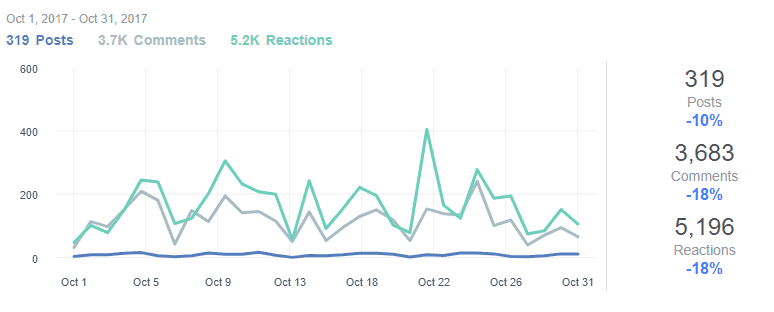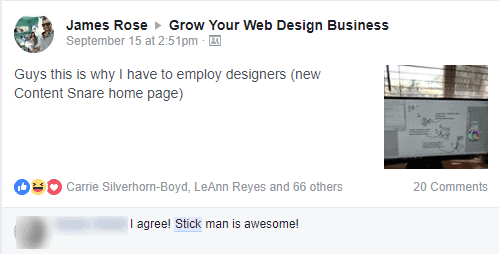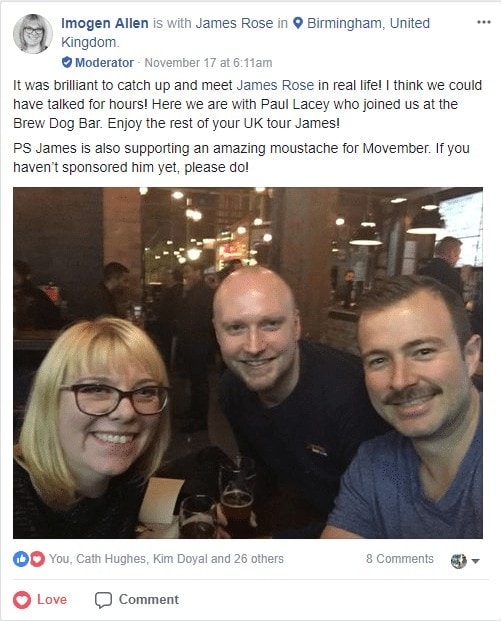Content Snare is actually our third software product. It's probably the first time it feels like we actually have a clue about what we're doing on the marketing front. Comparatively, the first venture is embarrassing to even think about how little we knew. It was something like 8 months in development (and completely built) before we even told the first person about it. Then started the several years worth of slogging to sell an SEO product in a slowly dying grey-hat market with established competitors. It was freaking brutal.

Mark (my business partner) and I regularly discussed ways to create "buzz" around the product. People always seemed to be talking about competitor's products. We had no idea how to get people talking about us. In our minds, it was just one of those things that those marketer types knew how to do...
Years later at a conference, I heard some stories about 2 businesses that kind of started by accident. Their stories were pretty similar - regularly posting on Facebook or Instagram, finding something that resonated with an audience, interacting with said audience... and eventually, their following is off the charts. At that point, their transition from social media hobby to real business was *almost* as simple as just asking their audience what they wanted, giving it to them and charging for it.
"Audience first"

When we first started building Content Snare and needed some marketing ideas, I remembered these stores. The "audience first" concept was maybe something we could replicate. Having read a lot about Facebook groups being all the rage, it seemed like as good a place as any to start.
Fast forward nearly a year and it's one of the best things that's happened to our business. The best part is that it's helped with way more than just growing revenue. First, a little summary of the group itself. It has just crossed over 2,500 people. That's after rejecting 50-60% of applicants for reasons we'll get into later. That's 2,500 different businesses who are mostly our exact target audience. I've had several people say the only reason they still use Facebook is to visit the group!
On average there are over 9000 interactions per month. Let that sink in... Imagine having direct conversations with hundreds or thousands of your target audience, as the get to know you and see your brand constantly... without spending a dollar. Most businesses would kill for that kind of access to their target market.
The rewards

It's a sounding board for almost anything
I've asked the group so many questions about all kinds of topics. From getting feedback on new homepage copy through to deciding if I should grow a moustache for Movember and risk creeping all our clients out. Every time there's a ton of people who jump on and provide honest feedback that has literally changed the business. Once I put up some stick figure mockups of the new homepage I wanted. People loved the stick figure dude so much he's now on the website, all through the software, on our business cards and t-shirts.
Product/Service feedback
While this probably falls into the same category as above, it deserves it's own mention, because it has been so important. At one point during the development of Content Snare, we ran into some growth issues. There was something wrong that people weren't telling us. The level of trust I had built up in the group meant that people, when asked to be brutal, provided the most important product feedback we received so far which completely changed our development roadmap. Not long after, growth picked back up.
Relationships
Saving the best for last... Oh man, this is the best part by a long shot. By spending so much time in the group helping people out or just posting useful/funny stuff, I've developed relationships with so. freaking. many. people. In a few days, we have a meetup in a city on the other side of the world where a few of us will meet in person for the first time. All from a Facebook group... Those relationships have turned into countless podcast interviews, marketing suggestions, private mastermind invitations, and the list goes on.
What's worked for us
Building a group isn't easy and can take a long time, but this section should speed things up for you. A friend of mine started a local small business group. His analogy was that for the first 6 months he was the "only guy on the dance floor" until the group finally took on a life of its own and people interacted with each other. Be prepared for that.
There are also a lot of ways to screw it up, which is why I think most groups descend into chaos and end up cesspits of spam and negativity.
That said, I had no freaking idea what I was doing at the start. It was just an idea that maybe we could get a bunch of people together and see what happened. We probably got lucky, but at least now I can show you what I think worked*. *I say "what I think worked" because when it comes to Facebook, it's hard to know what actually makes something more likely to show up in someone's feed, and thus help the group grow.
Using the right name and tags for the group
This one was a total accident. In the beginning, our target audience were web designers. What's something that web designers what to do? Grow their business... probably. That's how the highly original name "Grow Your Web Design Business" came about. We used tags around web design, development and freelancing.
Once the group started gaining steam, a huge volume of new members found the group through Facebook's suggested groups feature as they joined other groups. We know this because we had an entrance question asking where they heard about us. I get that a branded name might sound cooler, but I speculate that the extremely obvious name of the group worked in our favour. Not going to lie... I hate the name, but when I asked the group if we should change it, they shut it down HARD.
Group rules
I'm not sure if people read them, but you should at least write some rules so that you can refer to them when warning someone or booting them out. List what you will and won't accept, and what your group is about. Check out our group rules by visiting the group.
Interacting with EVERYONE
Especially in the early days. There reaches a point where this becomes impossible but at the beginning when someone posts a question, you better be all over that like a rash. If you don't know the answer, tag someone who does.
Posting genuinely useful stuff
Once a week, I dig through a list of blogs on Feedly that I regularly produce great content for web designers and digital agencies. Only the top 5% (approx) of posts get through. That means only the best of the best is being shared with the group. It all goes into Buffer to be spread out throughout the week. These posts often end up with big conversations going in the comments.
Introductions
In the beginning, when accepting new people to the group I tagged them all in a post asking them to introduce themselves. I like to think this helped get people engaged and get posts showing in news feeds. Who knows if it really worked. Eventually, it got too hard as the group grew, so I stopped.
Asking people to share something about themselves
People love sharing stuff, so these are some of the most popular threads in the group. On Monday we ask for 1 specific goal, on Wednesday they show off designs they're proud of, and on Thursday we ask a variety of questions. That might be something personal like "what do you consider your biggest ever achievement" (the most popular answer was raising kids!) or "if you could only work 2 days a week, what would you do".
Collaborating with other group owners
Through the group, I've met the owners of a bunch of groups with similar target audiences (that relationships thing again). Facebook gives you the option to 'suggest' other groups which are displayed across the top of your own. Our group suggests a few groups, and of course we're suggested in a few others. We share each other's content and get involved in each others groups. It's a total win-win.
Entrance questions and rejecting applications
Entrance questions are one of the best group features Facebook has ever introduced. You get to ask up to three questions when people request to join. These can be used for so many different things. These are ours:
Question: To avoid spammers, please just write OK in the box below. If you don't you'll be rejected.
Why: Front-line spam filtering. It's very easy to go through and reject anyone who hasn't typed in anything
Question: What's the biggest problem you have in your business?
Why: Customer research of course! We put every result in a Google sheet for analysis later
Question: We have a free weekly email with....(blah blah blah) enter your email here to get it (totally optional)
Why: Oh man I'm so devastated someone didn't put this idea in my head sooner. It's been a huge surprise how many people do this (I assumed it would be a tiny percentage). The same Google sheet above is read by Zapier to sign people up to our newsletter through a double opt-in. Facebook has also begun showing you a lot more info about the people who request to join. You can see when they joined Facebook, how many friends they have, how many groups they are in and more. These can be great indicators of potential spammers. If they are in more than 150 groups or joined Facebook yesterday, you can be fairly confident they won't be a good fit for the group. That's a big reject from us.
Zero spam tolerance
If someone posts blatant spam, especially within a day of joining (Facebook shows a "new member" flag on them), we boot and block with no warning. Aint nobody got time for that. If a post is borderline or they have been a model member to this point, they get a message warning and are written down in a spreadsheet.
Find a way to get people onto your email list
Building your entire community on someone elses' turf is super risky. There have been some big groups that have been shut down literally overnight with no explanation, crippling businesses. Assume that could happen at any time and have a plan. Find any way you can to get those people onto your Facebook page as fans so you can at least advertise an alternative if things shut down, or even better onto your email list. In our group, the pinned post is the same weekly newsletter in the entrance questions (mentioned above). There's probably something better we could do, but this is it for now. You can also post other things from time to time. For example, we got our first 5 Day Challenge subscribers through the group. If you do any kind of opt in or challenge that is relevant, post it up!
Find some moderators
Eventually, shit will just get too much for one person to manage. Especially with timezones, you'll want eyes on the group around the clock. Instruct them to bring down the banhammer on any spammers. It's so important to keep the group clean and full of awesome stuff only, so that people keep coming back. Ask a couple of your most active members if they'd like to be a moderator and let them know your warning and banning policies. We have a little Messenger chat going where we discuss any borderline posts.
Build relationships
Other than simply interacting with people in the group, you can also get on influencer's radar by sharing their content to an active audience. It generates goodwill which strengthens existing relationships and can start new ones.
Further reading
In the early days when I was researching all of this, I listened to Janet Murray's podcast about how to get more engagement in your group. You should definitely give that a listen. Janet is an absolute rockstar at PR (and business in general really), so check out her stuff.
What next?
If you're thinking about building a group, first be very clear if this is in line with where you want to take your business. Don't make a group just because everybody else is. There are enough abandoned groups already. It'll be a long while before the group becomes really active. You'll need to commit time to interacting with people and sharing a lot of stuff that gets zero engagement for at least a few months. If you're still convinced you need a group, get started now. Because it takes so long to gather momentum, the sooner the better. Also, make sure you are VERY clear on who you want in your group and what you need to share in the group that is super helpful for those people. Go and create your group!




